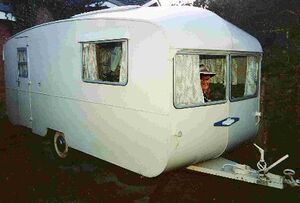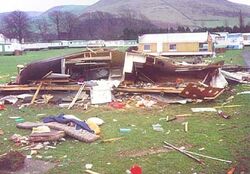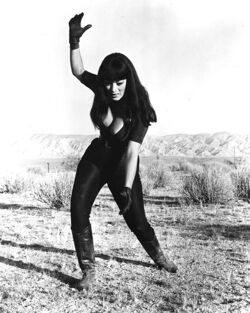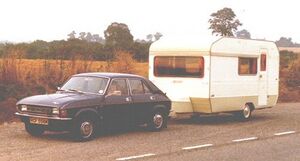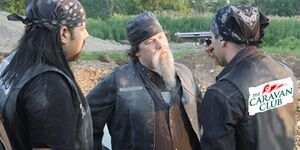Caravan Club
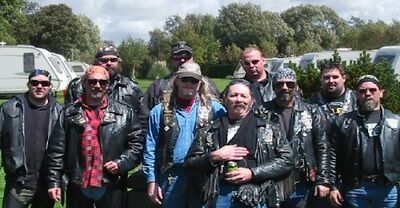
Imagine this scene: you, your good lady wife Muriel and your two charming daughters Prudence and Bernice are out for a Sunday drive - perhaps you've decided to tour the local countryside and enjoy a picnic on your way home from church, or maybe you're on your way to pay Great Aunt Florence a visit. Perhaps you're having a good old sing-song, the most enjoyable way to cement loving family ties.
Suddenly, you become aware of a strange, rumbling undertone to the angelic voices of your cherished family, a deep throaty roar that grows progressively louder. A flash of beige passes your window, followed by something large and off-white. "The maniac!" you think, as the slipstream buffets your car mercilessly, "He must be doing at least 50mph!" But the disturbing apparition does not vanish into the distance - instead, it careers wildly into your path. Your windscreen is filled with a large, flat expanse of fibreglass and plywood. With sinking heart you glance upwards and there it is, your worst nightmare - the words ABBEY GTS. It's a caravan. You'd heard of this happening to others, but somehow believed that it could never happen to you. The rear view mirror shows another beige car towing another caravan, and as you watch it approach two more draw up either side, boxing you in. The gingham curtains are plain to see, and they confirm your worst fears - you have encountered The Caravan Club.
What happens next is anyone's guess. Sometimes, they will speed off again, their criminal urges satisfied by having simply terrified a God-fearing, law-abiding citizen. Other times they might force you to pull into a quiet motorway service station where, if they take a liking to your car, they might leave you stranded. The worst case scenario is that they take a liking to your wife and daughters - or perhaps your wife and daughters will take a liking to them[1].
- ↑ Apparently, quite a lot of women are attracted to pot-bellied greasy blokes who never shave or wash. So maybe all we geeks need to do is buy caravans?
History[edit]
In the United States of America™, where the lawless, wide-open Wild West is still a living memory, the road-going outlaw remains a romantic and much-honoured tradition; one that stems, perhaps, from those not-too-long ago days when families and even entire townships would pack up their belongings into covered wagons and head out on the dusty trail to seek better lives in whichever place they ended up[1].
That tradition - and the wanderlust that drives on those who make it the very focus of their lives - remains strong, and in these days when so many Americans are tied down to soul-destroying jobs they cannot leave due to the mortgage and loan repayments it is viewed in an even more romantic light than ever before. Think, if you will, of those itinerant wanderers known in the rest of the world as tramps or the Homeless Community, viewed by many non-Americans as criminally insane alcoholics and heroin addicts - in the States, they are called hobos or drifters and most people will admit a secret admiration for them and confess to a longing for their care-free lifestyles. Consider for a moment the bikers, those leather-clad figures sometimes glimpsed on the freeways[2], whom most members of polite society view as nothing more than the most unpleasant criminals. Yet throughout America, they are held in such high regard that an otherwise normal obese, middle-aged businessmen will happily pay many thousands of dollars for a motorcycle customised to look like that of an outlaw biker and spend his Sundays cruising the highways even though it plays merry hell with his hernia, day-dreaming that he is a Hells Angel.
It is only in America that the drifter's life has become romanticised in this way, the subject of so many popular and critically acclaimed movies. Yet, despite what Hollywood suggests, that same wanderlust exists in other races too, most notably among the British; though there it has been utterly ignored by the silver screen[3]. Nevertheless, there are those Britons who refuse to accept a life of drudgery, who will not work themselves into an early grave while lining the pockets of The Man[4]. One such group took the same course of action as the Hells Angels - just as the bikers load up their Harley Davidsons with a bedroll and beer before they head out on the highway, lookin' for adventure and whatever comes their way, these renegades stock up their Volvos with PG Tips and McVitie's Digestives before hitting the open road with everything they need towed along behind the car.
Small gangs of outlaw caravanners began to make their presence known in the mid-1950s, when loosely-organised groups such as Satan's Slaves Touring Club of Norfolk and Renegade Happy Holidaymakers of Avon would turn up en masse at popular seaside resorts where they fought pitched battles with their sworn enemies the Campers. Sometimes they would swarm a campsite, reversing over tents and ripping the woggles off ramblers; eventually departing a week later and leaving the unfortunate owners of the campsite to pick up the used teabags strewn about their once pristine land. The police were stunned by their ferocity and unsure how to hold this new menace in check, and each newspaper report seemed only to inspire another collection of reprobates to form their own gang. Soon, there were hundreds throughout the Kingdom.
The gangs financed themselves through petty crime - smuggling contraband shortbread across the Scottish border and running the lucrative so-called Welsh Trade, in which alcoholic beverages would be smuggled into Methodist-controlled Wales and exchanged for surplus consonants which fetched a high price among the jazz club beatniks of London who used them for illegal scat singing. Soon, gangs began fighting one another for territory; this being overlooked by police who hoped that in time the opposing gangs would simply wipe one another out. For a time, it seemed they were right, because by 1965 gang membership was estimated to have fallen by 75%.
Outlaw caravan gangs may well have died out by the Summer of Love[5], along with sensible trousers and the concept of purchasing a packet of cigarette papers without being suspected of being a drug fiend, were it not for one man whose name is among the most notorious in modern British history. That man is Ralph Hubert "Ronnie" Barger, and it was under his leadership that outlaw caravanners began to organise themselves on a larger scale. The old, local gang identities - and a degree of autonomy - were retained, but each became part of a larger whole, a supergang headed by Barger himself. The whole was greater than the sum of its parts - by working together in this way the gangs were able to become massively more powerful and it was not long before they started to involves themselves in ever greater crimes. It was in this way that Barger created what became known as The Caravan Club and, by 1970, they had become the most powerful and feared criminal organisation in Britain.
- ↑ At least, that's what they hoped for. Many of them ended up in California, which is shit and full of hippies.
- ↑ No, not the ones in Lincoln Towncars - they're just businessmen who have forgotten to get changed after a visit to Madame Payne's House of Correction after work. We mean the ones on motorbikes. Nor do we mean the leather-clad figure sometimes glimpsed tied to a rack in your grandfather's "special room" - that's just his "friend" Bob from down the road.
- ↑ At least partially because an Austin Allegro spluttering its way past Junction 6 (Slough) on the M4, in the rain and heading for long delays caused by an overturned lorryload of Jammy Dodgers at the Catthorpe Interchange (you know, the one that gets you onto the M1) will never have quite the aesthetic charm of a Mustang cruising Route 66. Even if it's an orange Vanden Plas 1500cc model with the brown vinyl seats and the rectangular "sports" steering wheel.
- ↑ Even though this includes access to free healthcare - if there's one thing the Brits really love, it's getting free medicines for trivial ailments such as colds, thus increasing the financial burden felt by the NHS that they purport to love so much.
- ↑ Ask your parents about it. Actually, don't; unless you want to be bored shitless with tedious stories about flowerpower, peace and some half-rate Liverpudlian half-wits who were in some ancient band or other.
A Secret World[edit]
During the latter years of the 1970s, when Britain faced an economic slump the likes of which it had never before experienced[1] dark mutterings were heard from some sectors of society - the nation and its people would not tolerate much more, they claimed, and if things didn't improve soon there might just be a revolution.
Or course, those voices belonged to fools. The British are by nature an apathetic race, slow to anger (except when drunk and in foreign lands) and, if not content with their lot, accepting of it. Yet even they, under extreme circumstances, can become riled, as recognised by Mark Twain when he said that:
| “ | The Limeys are, as a whole, an effeminate and shit-soft bunch of pansies. But there are three things that only the greatest of fools would try to take away from them, for fear of the furious backlash - their crumpets, their cricket, buggery in public schools[2] and their caravans.[3] | ” |
Revolution was in the air, but being the wise race that they are the British looked at those nations to have revolted and saw that all to be achieved was another sort of equally oppressive society - or worse still, one headed by Nicolas Sarkozy. Realising that power corrupts and that even a poor and honest man placed in a position of political leadership will soon become the fattest pig at Manor Farm, they decided to simply live apart from the status quo, to strike out and form an alternative society based upon brotherhood and freedom. Not for them a life spent working for The Man, not for them the three-bedroomed semi in Surbiton. They craved the wide open spaces offered in locations such as Clacton, Eastbourne and Woolacombe Bay; and, as far as they were concerned, their limited needs could be met along the way, not in megastores owned by faceless corporations, upon which 99% of the population rely for sustenance, but ripe and ready for the picking on the rickety shelves of motorway service stations. Respectable caravanners worried that the outlaw gangs would lead to a crackdown on all caravan enthusiasts, quickly pointing out that the gangs made up no more than one percent of all caravan owners - which was just as quickly siezed upon by the outlaws, who began referring to themselves as one percenters.
By the turn of the decade, it is estimated that as many as several thousand outlaw caravanners could be found on the nation's roads and in campsites the length and breadth of the land. To many, they were a mystery, but to some they were intriguing. One of those who found himself within the latter group was author and gonzo jounalist Hunter S. Thompson, who traveled to Britain in order to spend time among them, studying them and making them the subject of what remains the most uncompromising, true-to-life, lurid examination of their lives, Caravan Club: The Strange and Terrible Saga of the Outlaw Caravan Gangs. The Times described Thompson's portrayal as "a world most of us would never dare encounter."
- ↑ And from which it was saved by Saint Thatcher when she did take up her sword and smite the poor, taking what little money they had and giving it to the rich so they could invest it and make even more money (which they then kept).
- ↑ For the benefit of Americans and other exotic species, there's a comprehensive explanation of the English public school system here.
- ↑ To this list should be added really bad pornography, warm lager, greasy food, ostentatious-yet-cheap nine carat gold jewelry from Elizabeth Duke, casual racism and Staffordshire Bull Terriers.
Club Structure[edit]
The Caravan Club is a nationwide movement, with affiliated gangs active overseas. It is then split into a number of subgroups, termed chapters, which take their name from their geographical location - for example, The Caravan Club of Lincoln, one of the oldest chapters, which counts current Club president Ronnie Barger among its members.
In addition to full members, the chapter will usually have a number of potential members known as prospects who may be made full members after they have completed a certain time with limited membership. There may also be club affiliates, caravanners who operate independently of the chapter and Club yet maintain close links and alliances with one or more chapters.
Each chapter will have a clubhouse, often located at a caravan showroom owned by a club member. These clubhouses are often heavily fortified and may contain stockpiles of weapons and ammunition, used to viciously defend the location against attacks by rival gangs or police raids. One raid on a clubhouse in Berkshire, believed by police to be a crucial part of the local illegal drugs trade, was repelled by chapter members armed with baseball bats, iron bars, chainsaws, handguns and even a submachine gun. The stand-off lasted for several weeks, with the chapter surviving on food[1] stored in the clubhouse, and culminated in a full-scale battle that saw more than 30 police officers seriously injured, after which the attempt to raid the premises was called off.
- ↑ Chiefly comprised of several tartan tins of Rich Tea biscuits, a box of 200 Yorkshire Blend teabags and a rather aged bar of Kendal Mint Cake.
Caravans[edit]
The Americans simply do not "get" caravans in the way that the British do. In the States, the term is synonymous with the Winnebago, a motorised vehicle closely resembling the sort of temporary classroom used by cash-strapped inner city schools and with aerodynamics to match. These vehicles are named after the Winnebago Native American Tribe[1] - which might appear to have a certain romance of its own, until one learns that the name Winnebago translates as "the people of the stinking water"[2]. Spend a few moments reading the names emblazoned upon the rakish, sleek caravans dotted about a British caravan site and it will be immediately apparent that a British caravan is a very different beast, characterised by a sense of purpose; these are devices which emanate power and their names reflect that fact rather than the bloated monstrosities that wallow around America[3]. Stop and admire the smooth, slippery profile of the Swift Challenger 540 (with integral step-lock). Marvel at the sheer technology involved in producing the razor-sharp leading edge of a Buccaneer Cruiser XT's roofline. Prepare to be silenced for around the corner comes... surely it cannot be... but yes! It is!... an Elddis Mistral EX300 with full matching tartan upholstery and a built-in lavatory with electrically-operated flush! Never before were mechanical excellence and pure luxury combined with such grace and efficiency, and truly we are blessed to behold such magnificence!
Of course, the outlaw caravanners take great pride in their machines, as reflected in the time they spend tuning and modifying them in a never-ending effort to make them better and more efficient than they were when fresh off the factory floor. Insult a Club member's caravan and expect a pounding, but compliment it and you may have made a friend - Thompson recounts the tale of a group of teenagers who, when a gang of vicious caravanners invaded their town and began smashing the place up, avoided a beating by saying to them "we like your caravans, man."
Power[edit]
A typical British caravan is powered by an outboard car, affixed to the front end by means of a towbar. There are no hard-and-fast rules concerning which types of car may be used - in times gone by, they would be almost exclusively British-built, with most being from the famous British Leyland plant at Longbridge in Birmingham, a location that has earned the same romanticised cachet among caravanners as Milwaukee among Harley Davidson enthusiasts, but in recent times with the introduction of the Toyota Landcruiser the use of Japanese powerplants has slowly become accepted among even the most traditional gangs. There is, however, a retro scene which is becoming ever more popular as people look to the past for new inspiration and adopt almost extinct styles, powering their caravans with the glorious British cars of the 1970s.
Customisation[edit]
Caravans are a common sight on the nation's roads, but not all of them belong to members of the Caravan Club. To distinguish the real thing from those who seek to emulate their ways, known as "wannabes" to Club members, one must look for certain signs. The first and most unmistakable is the presence of a Caravan Club sticker, usually displayed in the rear window of the caravan; but this is not always present. The second, which can leave no doubt, is evidence of customisation carried out by the owner. Wannabes pay garages vast sums to copy the Caravan Club look, but on closer inspection it will be obvious that all that is achieved in this way is a pastiche of the genuine article - the caravan will be just a little too shiny and the owner's hands will be soft and pale, unused to wielding tartan rugs and collapsible acrylic wine glasses. A look within the caravan will confirm your suspicions, for it is only within a real Caravan Club caravan that you will see the velvet cushions, half-size kettle, LPG water heater, folding TV satellite dish and complete set of Cade's Camping and Touring Site Guides. Take care, though - Caravanners don't take too kindly to strangers nosing around in their personal space!
A common custom addition is the SunnCamp Swift Porch Awning. This device, constructed of steel, fibreglass and polyester, offers a hydrostatic head of 2000mm and may have as many as three door options. Some Caravanners may even add a draught skirt and adjustable ladder band tensioning so that their caravan really stands out in a crowd. Equally popular is the addition of a vertical flue, which dramatically improves the performance of a Morco F11E or FEB-24 water heater in those caravans fitted with them - spot a caravan with such a flue protruding from the roof and you can be sure you're looking at a genuine outlaw Caravanner's caravan.
Criminality[edit]
Members and supporters of The Caravan Club insist that they are nothing more than an organisation of enthusiasts, a fraternity of like-minded people with a common interest and point to charitable events they run. Yet law enforcement agencies the length and breadth of Britain tell a different story and list hundreds, even thousands, of cases that seem to present contrary evidence.
Superintendent Gary McRabbs, the head of the nationwide Criminal Caravan Organisation Task Force, says that:
| “ | These gangs have, in recent years, organised a number of supposedly benevolent events in support of various charities. However, these events have a more sinister purpose - namely, legitimising the gangs in the public eye. Anyone who has crossed an outlaw caravanner, or otherwise invoked their ire or merely been a victim of their lawlessness, will be well aware that what we are dealing with here is a highly-organised, ruthless, vicious and violent gang of armed criminals. Anyone who combines tartan and gingham is, in my opinion and that of Her Majesty's courts, a criminal and deserves to be taken out of society. | ” |
Joining and the Patch[edit]
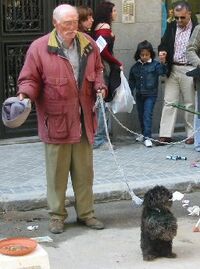
To join any chapter of the Caravan Club, the would-be member must first be invited by existing members - however, these will usually be friends of the applicant whom he or she had requested to extend an invitation; invitations do not usually arrive unsolicited (though this has been known, for example in instances where a "loner," a caravanner unaffiliated to any club, has attracted the attentions of Club members for some reason, either due to the impressive nature of the customisation work carried out on his caravan or after achieving victory in a fight with Club members.
If the invitation is accepted, the recipient becomes a prospect and must remain one for an unspecified length of time. A prospect's life is not an easy one, as he is likely to be used for all manner of menial tasks such as refilling the water tanks (which may entail a walk of up to several hundred metres on caravan sites with few drinking water taps), going to the site shop for teabags and - worst of all - manhandling the large plastic tanks into which a caravan's lavatory flushes to the waste disposal point and back. Yet these tasks, though tedious, dirty and physically demanding, are merely the everyday activities a prospect is expected to carry out without complaint. One day, possibly years into the future, the time will come when he is called upon to carry out the mission that will earn him the right to call himself a full member and to wear the Club's insignia. That mission may be literally anything - he may be required to courier drugs, in which case he will be expected to swear he will take full personal blame if he is caught by the police, he may be required to brazenly walk into the clubhouse of a rival gang and execute a member (an act that may well lead to his own murder), but having spent years as a prospect the majority potential members carry the act through no matter how hard it may be.
The Future[edit]
Though there are many clubs for one percenter caravan enthusiasts, The Caravan Club is by far the largest and most powerful, which has allowed it to achieve dominance. This means that although members are known for their violence, slayings have actually decreased as most outlaw caravanners are now part of the organisation - partially as a result of the culture of mutual respect among members and partially because, as Caravan Club Somerset Chapter member Morris "Mad Dog" Mappleswick puts it, "we all know that infighting in the Club would bring about a total fuckin' bloodbath, man, ain't nobody wants shit on that scale." This means that far from wiping themselves out, as the police once hoped they would, the Club looks set to survive for at least the foreseeable future. Britain's roads and campgrounds will remain dangerous places for the law-abiding for many years to come.
Meanwhile, police seem to be taking a softly-softly approach. "We are aware of the public'c concerns," says Superintendent McRabbs, "but people must understand that this is a highly organised gang and we are consistently met with a veil of secrecy. Nevertheless, we shall continue to monitor the situation." Which, as those who understand police code will know, means: "There's basically sod all we can do about it - and if you had to put in as much unpaid overtime as we do, you wouldn't want to get involved either."
